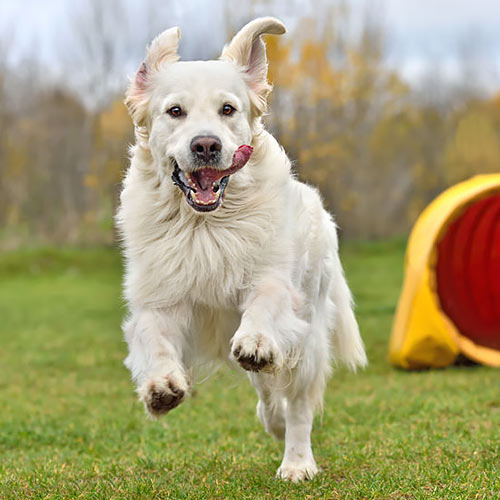It’s a beautiful day and you’ve decided to take your four-legged friend for a walk in the park. You meet several people and a few dogs on the trail and all is well. You’re enjoying the filtered sunshine through the canopy of branches overhead, breathing the fresh air and enjoying the day together. Then it happens. You come to a large flight of stairs on the trail. As you take the first step, Fido goes nuts. He’s frantically pulling on the leash and giving fearful whines and barking every time you try to get him to take a step. Your great day at the park dissolves into a fight with Fido, who is disturbing your peace and quiet along with everyone else’s.
Chances are, this scenario could have been avoided.
Puppies who are socialized to different situations when young usually develop into well-balanced dogs. Their ability to adjust is enhanced when the owner makes a concerted effort to present them with a large number of life’s possibilities while they’re still young. Stairs, greeting strangers (two-legged and four-legged), hearing loud noises, crates or kennels, and even the lawnmower are just a few of the things a puppy-owner needs to consider.
Puppy socialization actually begins very shortly after birth. Puppies in a litter learn how to interact with one another – sometimes balanced and healthy and sometimes not. Puppies learn a great deal about life simply by playing with their litter-mates. They pounce on or ambush a brother. Maybe they are “arguing” over a teat or a toy. Sometimes Mother has to step in and break up the fight.
Socialization with other dogs is an important aspect of a dog’s life. Even a dog who lives in the country and rarely leaves the farm needs to know how to get along with others. The city dog who takes frequent walks with his human needs to know how to properly greet others. Some dog fights could have been prevented simply with a little socialization at an earlier age.
The best age to begin purposeful socialization is typically between 8 and 10 weeks of age. If these puppies leave their own surroundings under the control of their human (strongly recommended), be sure they have had at least their first set of shots. Contagious diseases are a large concern for puppies. Properly vaccinate and then get busy. Let them meet other pups/dogs as much as possible (make sure they’re supervised). A good puppy class can prove beneficial here. Socialization with cats is helpful also. Cats have a way of setting their own boundaries with dogs/puppies 🙂
Socialization with humans is very important. Just because a pup/dog bonds with their owner doesn’t mean they’ll get along with other humans. Proper socialization here can pose a challenge to the dog owner. The pup needs to meet as many people as possible: large people, skinny people, people who wear hats or sunglasses, loud people, the lady in the wheelchair, the guy on crutches etc. And don’t forget little people. A pup/dog who lives in a home without children can be annoyed and/or feel threatened by the quick, jerky movements and loud noises of these short humans. Teach the child how to approach a dog: slowly, not screaming or flaling the hands/arms. Seeing a child on a bicycle would be a good thing for your dog as well.
A pup should have the opportunity to meet as many different people from different ethnic groups as well. While it is all but impossible to meet every race or group of people, yet a pup can learn that people different than their own human do not pose a threat or cause for alarm (in fact, some humans would benefit from learning this lesson themselves 🙂 A pup growing up with no man in the house needs to meet men. Typcially dogs don’t have issues with women, even if they live in a house without a woman around.
Socialization to environmental factors is very important also. Consider the dog who lives in a house. He must become accustomed to vacuum cleaners, blenders, hair dryers, the movement of brooms/mops, slick floors and so on the list goes. Introduce noisy items slowly from a distance at first. If the dog shows no sign of fear or agitation, gradually decrease the distance. An outdoor dog will need to learn about lawn mowers, trimmers, possibly snow blowers. Dogs accustomed to gunshots seldom fear thunder. Socialization goes a long way in producing a well-developed dog.
Other concerns may be stairs (breeds who have a history of hip displaysia should not get a steady diet of stairs until they’re at least a year old – socialization around a step or two is fine), a visit to the vet’s office (schedule a friendly visit without shots or intruding thermometers when the pup gets a nice treat and scratching behind the ears), possibly being around horses or cattle, rabbits or chickens may be a need for your dog. Try to think ahead for the pup and let him encounter as many situations as possible.
Proper socialization at a young age will go a long way in reducing or eliminating behavioral problems for your dog in the future. The effort you give to socialization will reap dividends many times over.

